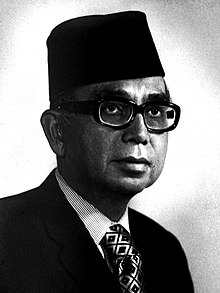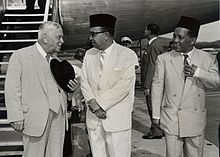Abdul Razak Hussein | |||||||||||||||||||
|---|---|---|---|---|---|---|---|---|---|---|---|---|---|---|---|---|---|---|---|
عبد الرزاق حسين | |||||||||||||||||||
 Abdul Razak c. 1960s | |||||||||||||||||||
| 2nd Prime Minister of Malaysia | |||||||||||||||||||
| In office 22 September 1970 – 14 January 1976 | |||||||||||||||||||
| Monarchs | |||||||||||||||||||
| Deputy |
| ||||||||||||||||||
| Preceded by | Tunku Abdul Rahman | ||||||||||||||||||
| Succeeded by | Hussein Onn | ||||||||||||||||||
| 1st Deputy Prime Minister of Malaysia | |||||||||||||||||||
| In office 31 August 1957 – 22 September 1970 | |||||||||||||||||||
| Monarchs |
| ||||||||||||||||||
| Prime Minister | Tunku Abdul Rahman | ||||||||||||||||||
| Preceded by | Office established | ||||||||||||||||||
| Succeeded by | Ismail Abdul Rahman | ||||||||||||||||||
| 1st Chairman of Barisan Nasional | |||||||||||||||||||
| In office 1 January 1973 – 14 January 1976 | |||||||||||||||||||
| Preceded by | Position established | ||||||||||||||||||
| Succeeded by | Hussein Onn | ||||||||||||||||||
| 3rd President of the United Malays National Organisation | |||||||||||||||||||
| In office 25 January 1971 – 14 January 1976 | |||||||||||||||||||
| Preceded by | Tunku Abdul Rahman | ||||||||||||||||||
| Succeeded by | Hussein Onn | ||||||||||||||||||
| 3rd Menteri Besar of Pahang | |||||||||||||||||||
| In office 1 February 1955 – 15 June 1955 | |||||||||||||||||||
| Monarch | Abu Bakar | ||||||||||||||||||
| Preceded by | Tengku Mohamad Sultan Ahmad Mu'azzam Shah | ||||||||||||||||||
| Succeeded by | Tengku Mohamad Sultan Ahmad | ||||||||||||||||||
| Member of the Malaysian Parliament for Pekan[a] | |||||||||||||||||||
| In office 11 September 1959 – 14 January 1976 | |||||||||||||||||||
| Preceded by | Constituency established | ||||||||||||||||||
| Succeeded by | Najib Razak | ||||||||||||||||||
| |||||||||||||||||||
| Personal details | |||||||||||||||||||
| Born | Abdul Razak bin Hussein 11 March 1922 Pekan, Pahang, Federated Malay States | ||||||||||||||||||
| Died | 14 January 1976 (aged 53) London, England | ||||||||||||||||||
| Cause of death | Leukemia | ||||||||||||||||||
| Resting place | Makam Pahlawan, Masjid Negara, Kuala Lumpur, Malaysia | ||||||||||||||||||
| Political party | Labour Party (UK) (1947–1950) United Malays National Organisation (1950-1976) | ||||||||||||||||||
| Other political affiliations | Alliance Party (1955–1973) Barisan Nasional (1973–1976) | ||||||||||||||||||
| Spouse | |||||||||||||||||||
| Children | 5 (including Najib and Nazir) | ||||||||||||||||||
| Education | Malay College Kuala Kangsar | ||||||||||||||||||
| Alma mater | Raffles College (unfinished) Lincoln's Inn (LLB) | ||||||||||||||||||
| Profession | Lawyer | ||||||||||||||||||
| Military service | |||||||||||||||||||
| Branch/service | Askar Wataniah Pahang | ||||||||||||||||||
| Years of service | 1941–1945 | ||||||||||||||||||
| Rank | Captain | ||||||||||||||||||
| Unit | Force 136 | ||||||||||||||||||
| Battles/wars | World War II | ||||||||||||||||||
Tun Haji Abdul Razak bin Dato' Haji Hussein (Jawi: عبد الرزاق بن حسين; 11 March 1922 – 14 January 1976) was a Malaysian lawyer and politician who served as the second prime minister of Malaysia from 1970 until his death in 1976. He also served as the first deputy prime minister of Malaysia from 1957 to 1970. He is referred to as the Father of Development (Bapa Pembangunan).
Abdul Razak was the figure responsible for setting up Barisan Nasional (BN), which is the ruling coalition of political parties that held power in Malaysia. Abdul Razak is also renowned for launching the Malaysian New Economic Policy (MNEP).
His eldest son, Najib Razak, became the sixth prime minister in 2009; Najib is the first prime minister of Malaysia to be a descendant of a former prime minister.
Born in Kampung Pulau Keladi, a village located northwest of Pekan, Pahang on 11 March 1922,[1] Abdul Razak is the first of two children to Yang Dihormati (YDH) Orang Kaya Indera Shahbandar ke-9, Dato' Hussein Awang bin Mohd Taib (1898–1950) and Datin Hajah Teh Fatimah bt Daud (1906–1968). An aristocratic descendant of Orang Kaya Indera Shahbandar, Abdul Razak studied at the Malay College Kuala Kangsar.
After joining the Malay Administrative Service in 1938, he was awarded a scholarship to study at Raffles College in Singapore in 1940. His studies at the college ceased with the onset of the Second World War. During the war he helped organise the Wataniah resistance movement in Pahang.[2]
After World War II, Abdul Razak left for Britain in 1948 to study law. In 1950, he received a law degree and qualified as a barrister at Lincoln's Inn in London. During his student days in England, Abdul Razak was a member of the British Labour Party and a prominent student leader of the Malay Association of Great Britain. He also formed the Malayan Forum.
After his studies were interrupted in 1942 because of World War II, Abdul Razak returned to Kuantan, Pahang. There, he met his former colleague from the Malay Administrative Service, Yeop Mahidin, and expressed his interest in joining the Malay Regiment (now Royal Malay Regiment). Mahidin, who is also the founder of Askar Wataniah Pahang ('Pahang State Territorial Army'; precursor of Rejimen Askar Wataniah), recruited Razak into his new guerrilla forces. After finishing his training under Mahidin, Razak was instructed by him to join the Japanese Malayan Civil Service as an agent and informant.[3][4]
After finishing his Japanese Military Training, Razak, as an aristocrat and son of a respected Malay leader in Pahang, was posted to his home-state Pahang as an assistant to District Officer and at the same time as a bridge for the Japanese to gain the trust of local Pahang Malays. Using his privileges as an aristocrat, Razak started networking with the Japanese Imperial Forces while maintaining his connection with Yeop Mahidin. His role as an informant inside the Japanese Administration was known only to a few of Wataniah members including Mahidin. Because of this, Razak was labelled as a traitor by the rest of the Wataniah Pahang.[3][4][5]
At first, the Malays were not fully trusted by the British to fight the Japanese because of a few incidents and better treatment by the Japanese Administration towards Malays compared to other races. After gaining sufficient trust, the Askar Wataniah Pahang with its 200 members was absorbed into the Special Operations Executive (SOE) and made into Force 136 Pahang.[3][4][5]
Force 136 Pahang's missions' continuous success made the Japanese Administration begin to suspect that there were informants inside their administration. Force 136 Pahang quickly set up an extraction mission to recover their agent, Razak, who was still unknown to many of its members.[3][4]
After he had been successfully extracted, Razak continued his work with Force 136 and was promoted to the rank of captain. Among notable missions, Razak was involved in the rescue of Sultan Abu Bakar of Pahang.[3][4][dubious – discuss]


Upon his return from the United Kingdom, in 1950, Tun Razak joined the Malayan Civil Service.[1] Owing to his political calibre, he became the youth chief for United Malays National Organisation (UMNO). Two years later, he worked as the Assistant State Secretary of Pahang and in February 1955, at just 33 years of age, became Pahang's Chief Minister.
Razak stood in and won a seat in Malaya's first general elections in July 1955 and was appointed as the Education Minister. He was instrumental in the drafting of the Razak Report which formed the basis of the Malayan education system. Tun Razak was also a key member of the February 1956 mission to London to seek the independence of Malaya from the British.[1]
After the general elections in 1959, he became the Minister of Rural Development in addition to holding the portfolios of Deputy Prime Minister and Minister of Defence, which he held from 1957.[1] His achievements include formulating the development policy known as the Red Book.
At the time of Separation of Singapore from the Federation of Malaysia in 1965, Tun Razak realised that UMNO needed more young leaders in the party. Faced with, amongst other things Lee Kuan Yew's considerable oratorical skills, Razak wanted young Malay leaders – grounded in their own faith and culture – who would be able to speak and if necessary debate both in the Malay language and English language.
Razak understood that power resided in the Malay community and that for this power to be wielded effectively, the elite among the Malays had to be an elite determined by ability, aptitude and commitment to the nation as a whole. Class, birth and money were secondary in his calculations.
As a consequence of this initiative, the then young leaders of mixed heritage in UMNO, such as Mahathir Mohamad, were drafted into higher echelons of the political establishment.
In 1967 he was awarded the Ramon Magsaysay Award for community leadership.
After the 13 May Incident 1969, Tunku Abdul Rahman Putra Al-Haj received many criticisms from various parties for his inability to deal with racial issues. This led to his resignation as prime minister. Tun Abdul Razak then imposed a State of Emergency, ruling by decree as the National Operations Council until 1970.[1] In September 1970, Tunku Abdul Rahman was succeeded by Tun Abdul Razak as the Prime Minister of Malaysia.
Tun Razak set up the Barisan Nasional or National Front on 1 January 1973 to replace the ruling Alliance Party. He increased the membership of its parties and coalitions in an effort to establish "Ketahanan Nasional" (National Strength) through political stability.
Tun Razak is also renowned for launching the Malaysian New Economic Policy (MNEP) in 1971. He and the "second generation" of Malay politicians saw the need to tackle vigorously the economic and social disparities which fuelled racial antagonisms and violence. The MNEP set two basics goals – to reduce and eventually eradicate poverty, and to reduce and eventually eradicate identification of economic function with race.
Abdul Razak was diagnosed with leukemia but kept it secret since 1969.
Abdul Razak died in office on 14 January 1976[1][6] while seeking medical treatment in London. He was posthumously granted the soubriquet Bapa Pembangunan ('Father of Development'). He was laid to rest in Heroes Mausoleum (Malay: Makam Pahlawan) near Masjid Negara, Kuala Lumpur.
| Year | Title | Role | Notes | Link(s) | ||||
|---|---|---|---|---|---|---|---|---|
| 1969 | The Red Book | Himself | Tun Abdul Razak makes his debut in the film to explain the policy of rural economic development.[7] The film was produced by Malayan Film Unit (currently FINAS). |
| ||||
| Year | Constituency | Candidate | Votes | Pct | Opponent(s) | Votes | Pct | Ballots cast | Majority | Turnout | ||
|---|---|---|---|---|---|---|---|---|---|---|---|---|
| 1959 | P062 Pekan, Pahang | Abdul Razak Hussein (UMNO) | 8,811 | 77.26% | Mohamed Ariff Abas (PMIP) | 2,593 | 22.74% | 11,508 | 6,218 | 74.52% | ||
| 1964 | Abdul Razak Hussein (UMNO) | 11,858 | 87.39% | Abdul Hamid Awang Hitam (PMIP) | 1,711 | 12.61% | 14,165 | 10,147 | 76.63% | |||
| 1969 | Abdul Razak Hussein (UMNO) | 12,641 | 77.28% | Yazid Jaafar (PMIP) | 3,716 | 22.72% | 16,845 | 8,925 | 71.24% | |||
| 1974 | P071 Pekan, Pahang | Abdul Razak Hussein (UMNO) | Unopposed | |||||||||


Several things were named after him, including:
Motion picture & television
Stage/Theatre
((cite web)): CS1 maint: unfit URL (link)
| Grand Collar (Supremo) | |
|---|---|
| Grand Cross (Bayani) |
|
| Grand Officer (Marangal na Pinuno) | |
| Commander (Komandante) | |
| Officer (Pinuno) | |
| Champion for Life (Kampeon Habang Buhay) | |
| International | |
|---|---|
| National | |
| People | |
| Other | |